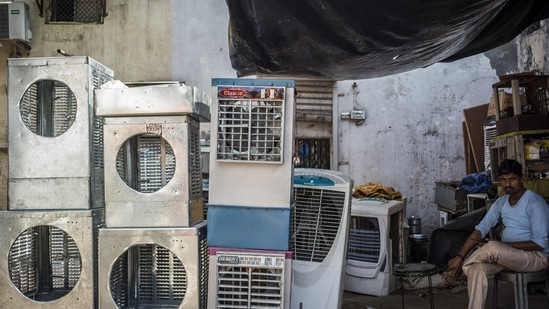Heatwaves: Rethink India’s energy mix
While India contributes way less than the advanced world to the global emissions pie, the decision to reduce climate impacts for its large vulnerable population will have to be the main driver while making energy choices now
The Indian subcontinent is reeling under unprecedented high temperatures. However, this should not surprise anyone: Climate scientists have been warning us about global warming for decades now. Today, we are facing the consequences of our collective inaction.

Since 2013, Ahmedabad has been educating citizens on heatwaves. It is the first city in India to initiate a heat action plan, which offers guidelines to reduce the health impacts of heat. Yet, there are limits to such adaptation efforts; mitigating or lowering emissions is an urgent need and necessary to avoid the growing risks to our lives and economies. This means giving up coal and gradually reducing dependence on fossil fuels. Coal is one of the biggest contributors to the climate crisis, and burning coal for power emits the highest greenhouse gases compared to any other source. India is the second largest coal consumer after China.
While India contributes way less to the global emissions pie, the decision to reduce climate impacts for its large vulnerable population will have to be the main driver while making energy choices now. Since 2019, Gujarat has decided not to invest in new coal-based power plants. This choice is largely influenced by the falling prices of wind and solar power, and the threat of thermal power plants becoming “stranded assets” in the future, owing to the threats and risks coal investment poses.
Gujarat has been a leader in renewable energy, with a sound policy framework, regulatory support, and substantial capital investment in the last two decades. Currently, 16,700 MW of the state’s installed power capacity is from renewable sources, and it is committed to meeting any increase in power demand only through the renewable sector.
The power sector needs significant reforms given the energy mix we envision for 2030. It is a fact that DISCOMs are the key focus points in the power sector and that reforms in the sector would mean getting them gradually to be more rational in power tariffs across users.
While over half the country’s DISCOMs are in a bad shape, Gujarat’s distribution companies have shown better financial discipline. This is because the UDAY scheme has worked for the state. But ultimately, DISCOMs should have the flexibility to participate in the national grid and take power from alternate renewable sources through transparent and open access process. This can reduce the burden on DISCOMs, the exchequer, and the price-sensitive Indian consumer.
The transition will also be facilitated by technology and innovation. Battery storage, for instance, can play a huge role in reducing intermittency, which is the critical link to ensuring a steady supply of power and allowing scheduling of power. Green hydrogen seems to be the other promising source of energy. If India can manufacture at competent prices, this can enable India to become an energy export hub and truly Atmanirbhar in the energy sector.
In the meantime, we already have RE, which is affordable, bankable, and can be ramped up to meet our growing energy needs without getting into a trap of stranded assets and honouring PPAs with inflated coal prices. Financial institutions can play a significant role in facilitating rapid uptake and deployment. Staying within the limits of 1.5 degrees is far from ideal, but that’s the minimum we need to strive for. The latest Intergovernmental Panel on Climate Change report is clear that concerted and robust climate commitment is no longer a choice. It is a survival imperative.
Shwetal Shah is technical adviser, climate change department, Government of Gujarat
The views expressed are personal



